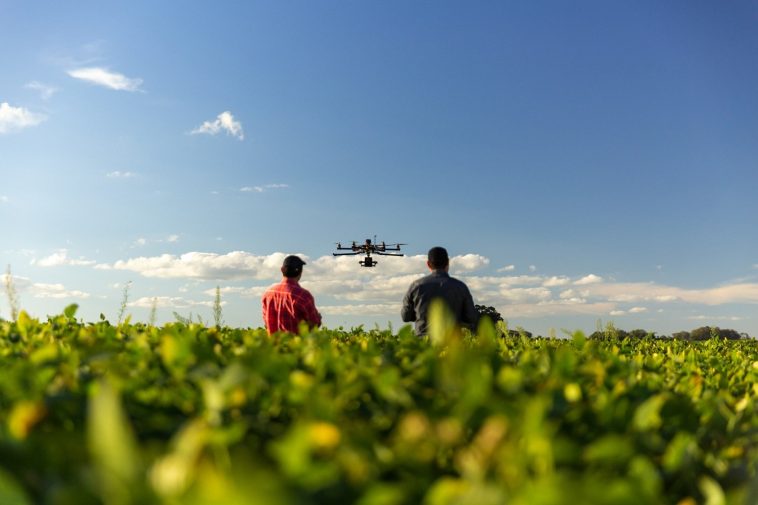We blotted out the stars and became frightened when we saw our own lights amidst the darkness. America is in the midst of a full-on drone panic and it’s gotten very stupid. People in the northeast part of the U.S. are freaking out about strange lights in the sky and spinning all kinds of conspiracy theories. The dark truth is that American memories are short and we’ve panicked about lights in the skies—be they drones, UFOs, or German bombers—many many times before.
Over the past few weeks, people in New Jersey and NYC have pointed to the sky and quaked in fear at the strange lights above them they had never noticed before. The FBI has held briefings about the issue. New York State closed some runways at Stewart International Airport in Poughkeepsie. The White House is asking Congress to do something.
We have been here before. Recently. And what’s frustrating, to me, about this is that we’ll do it all again in a few years. And when it happens, we don’t remember all the sky panics that have come before.
It’s natural to be afraid of things we see in the sky and don’t understand. It’s been happening for hundreds of years. The only thing that changes, from century to century, is the explanation for the fear. The answer to that question tells you about the society that’s afraid, but it may not give you an explanation of what actually happened.
“The airspace above us is big, mysterious, and spooky. It’s totally natural that people project wild visions of secret, unknowable aircraft onto the night sky,” Arthur Holland Michel, a journalist who covers drones and a senior fellow at the Carnegie Council for Ethics in International Affairs, told Gizmodo
“At the same time, I don’t think we should dismiss right out of hand every potential drone sighting,” he added. “We know for a fact that drones can sometimes be used to do harm, and we probably shouldn’t lose sight of that fact just because a bunch of people see drones in the sky that do not, in fact, exist.”
Over the past 25 years, there’s been a lot of panic about strange lights in the sky that mirror what’s happening in New Jersey right now. In the last month of 2019 and the first month of 2020, people in Colorado were convinced they’d seen unexplained lights in the sky. Like in 2024, the national press covered it and local politicians quavered. Washington promised to do something. The cases that could be verified and chased down had mundane answers. They were planes, commercial drones, and other common objects.
In 2016, a passenger plane was landing at Heathrow International Airport when it collided with what it thought was a drone. Had it actually happened, it would have been the first time a commercial airplane had struck a drone mid-flight. A report later found it was probably a plastic bag.
One of the first great panics about lights in the sky happened in Canada, not the U.S. In 1915, after Canada had entered World War I, the city of Ottawa became convinced it would soon be attacked from the sky.
The mayor of the town of Brockville, Ontario called the Prime Minister on February 14, 1915, with an incredible story. The mayor said that three German airplanes had penetrated Canadian airspace from New York. Dozens of citizens had seen them. The planes shined a light across the town and they dropped fireballs.
Freaked out, the Prime Minister placed some calls of his own. Fearing an attack, much of Ottawa went dark. “Ottawa In Darkness Awaits Aeroplane Raid. Several Aeroplanes Make A Raid Into The Dominion Of Canada,” read a newspaper from the time. No attack came and later some kids admitted to sending up balloons loaded with fireworks in a village near Brockville. They wanted to scare people. They didn’t realize it would shut down their nation’s capital for a few hours.
Similar scares happened across the eastern seaboard in the U.S. over the next few years. As World War I ground on, the nation was convinced that German spies were piloting strange planes in the sky. In 1916, the sightings were centered around Delaware, New Jersey, and Washington D.C. In 1917, a week after the U.S. entered World War I, two National Guardsmen in New Hampshire fired on a strange light they saw in the sky.
During World War II, America trained its citizens to be paranoid about what it saw in the sky. Driven by a fear of attacks on the mainland, and a need to make citizens feel like they were part of the war effort, the U.S. Civil Defense Forces launched the Ground Observer Corps. Americans trained on what Axis aircraft looked like and then sat in 14,000 coastal locations and scanned the skies with binoculars.
After the war ended people didn’t hang up their binoculars. The U.S. had trained more than a million of its citizens to watch the skies. And so they did. In 1947, a military balloon crashed in Roswell, New Mexico, and it kicked off the first great sky-watching panic of the post-war years. UFOs were already in the news before the crash, but Roswell supercharged the phenomenon.
“The Roswell crash was discovered weeks before the rancher who discovered it reported it. For weeks it was just weird wreckage and trash in the high desert,” Kelsey Atherton, an editor at the Center for International Policy, told me. “And then, after reading the news of flying saucer sightings, the rancher who discovered it reported it to the sheriff, which retroactively made it the most famous UFO site. But without the panic, it’s just a rancher who saw some junk.”
The Cold War years were awash in fears about strange objects in the sky. It permeated our media, birthed subcultures, cults, and repeated panics. Some feared it was advanced Soviet weapons systems but, today, we remember it mostly as aliens. The Cold War UFO panic reached its apotheosis in the Clinton years with the airing of X-Files, a paranormal procedural whose mythology focused heavily on UFO myths.
As a new century dawned, the old fears of lights in the sky faded a bit. But they come back with a vengeance. As part of the Global War on Terror, America was using unmanned aerial vehicles to assassinate its enemies. On the homefront, affordable quadcopter drones hit the market and small objects took to the skies in droves.
The shape of what we feared was in the sky changed. No longer Soviet super weapons or UFOs, people began to see consumer drones flying through the sky. And they feared them. Journalist and drone expert Faine Greenwood predicted this in 2019, months ahead of the panic in Colorado.
“An essential part of being human is our drive to ascribe meaning to things that we cannot adequately explain, and all of us do it, including the most brilliant and believable among us. The best we can do is to mitigate this natural tendency, because while it is understandable, it can be counterproductive,” Greenwood wrote in Salon back then. “If we jump too quickly to the assumption that something weird in the sky is a drone, we might miss out on other explanations, like errant weather balloons, plastic bags, or, sure, alien spacecraft. An overemphasis on one kind of threat or problem can lead us to miss other problems.”
Greenwood’s Salon piece contains other sky panics from the era, including sightings at Gatwick airport during the holiday season, more sightings at Heathrow, and the brief shuttering of an airport in Australia after staff mistook a balloon for a drone.
I reached out to Greenwood to see what their favorite little-known drone panic is and they went farther back than 100 years. Greenwood says they’re “very interested in the U.K. 1909 and 1913 mystery airship panics. I also like the 1561 celestial phenomena over Nuremberg,” and pointed me to Roman writings about strange things in the sky.
Humans, it seems, have long been fascinated and frightened by strange things in the sky. As Michel cautioned, it’s important to remember that the panics of the past and present don’t mean something isn’t going on. As Greenwood cautioned in 2019, it’s important to focus on what’s actually happening around us.
Drones and cameras are ubiquitous. They’re both weapons of war. The dominant visual of the war in Ukraine is that of an FPV drone. The viewer sits aboard the machine as it hunts down a soldier in a trench. It finds them. The soldier panics and fires at the sky. But it’s no use. The drone descends, the camera cuts out, and we know the soldier is dead.
Authorities across the planet are putting cameras on flying machines and using them to spy on citizens, customers, and enemies. We read about it daily. We know it’s happening. Is it any wonder, then, that we look up in the sky and fear what might be watching or waiting in the wings to deliver death for some unseen and unknowable purpose?





GIPHY App Key not set. Please check settings